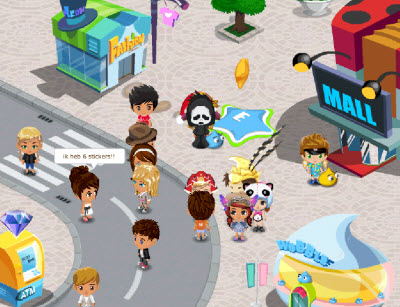
But Eccky has carved out a nice space in the market with its virtual game world for children in the Netherlands. It launched in the spring of 2010 on Hyves, a leading social network in the Netherlands with more than 10 million members, or twice as many as on Facebook. Now it is preparing to come to North America.
[aditude-amp id="flyingcarpet" targeting='{"env":"staging","page_type":"article","post_id":248576,"post_type":"story","post_chan":"none","tags":null,"ai":false,"category":"none","all_categories":"business,games,","session":"B"}']If it can succeed, Eccky is a good example of backfilling, or going through old neighborhoods and finding the best places to build new homes. It works as a good strategy for homebuilders, and maybe game publishers as well. Eccky’s version of this strategy is to combine the elements of a virtual world with a social game; it combines open-ended play with mission-oriented quests.
In other words, the virtual world market was supposed to be done, at least when it came to startups. Disney signaled the consolidation in 2007, when it bought Club Penguin for $350 million, plus bonuses of another $350 million. But that just inspired dozens of copycat start-ups.
AI Weekly
The must-read newsletter for AI and Big Data industry written by Khari Johnson, Kyle Wiggers, and Seth Colaner.
Included with VentureBeat Insider and VentureBeat VIP memberships.
A handful survived and grew into the millions of users. The survivors include Poptropica, WebKinz, RuneScape, Moshi Monsters, Fantage and Secret Builders. Toy makers and entertainment companies are hovering over the space to see how they can participate.
While Eccky is small, it has a very engaged audience, playing an average of 40 minutes a day (logging in twice a day for 20 minutes each session), said Gideon Richheimer, managing partner at AmsterdamPark Capital, which helped Eccky get off the ground and funded it.
Eccky targets children ages eight to 14. They can log on via the web site or through the social network. The company has six employees and uses a 12-person developer team as contractors to build the world.
[aditude-amp id="medium1" targeting='{"env":"staging","page_type":"article","post_id":248576,"post_type":"story","post_chan":"none","tags":null,"ai":false,"category":"none","all_categories":"business,games,","session":"B"}']
The art style is similar to virtual worlds such as the seven-year-old Habbo, but the game play is more unique. You can create outfits and sell them, decorate a room, customize your avatar, and level up through various quests. The Eccky team stages regular events around holidays such as Christmas or Easter.
As with worlds such as Fantage, kids like the crowded spaces within Eccky, even though it’s sometimes hard to hold a live chat conversation with someone in such quarters.
“We know there is a lot of competition out there,” Batist said. “We’ve grown fast and so we feel we are doing something right with our focus on role playing.”
The company is focused on growing its user base, but monetization is in place with sales of virtual goods, and the numbers of people spending money is meaningful. Eccky has also taken full advantage of using social media to spread the word about the company.
[aditude-amp id="medium2" targeting='{"env":"staging","page_type":"article","post_id":248576,"post_type":"story","post_chan":"none","tags":null,"ai":false,"category":"none","all_categories":"business,games,","session":"B"}']
Eccky is funded and is not looking for funding now. As it expands, the company plans to hire a small country team and handle development through partners. That’s a pretty capital-efficient way of expanding around the globe. There’s still a lot of rivals out there, including virtual worlds like Habbo, Stardoll, Maple Story, Weeworld, Woozworld, Club Penguin, and others.
Investors include MM Ventures (Michiel Mol of Guerilla Games and Maarten Elshove of MaxCredible), AmsterdamPark Capital, Thijs Bosma, founder of TribePlay, and Yme Bosma, vice president of business development at Hyves. The company has raised more than a million euros but won’t say how much.
VentureBeat's mission is to be a digital town square for technical decision-makers to gain knowledge about transformative enterprise technology and transact. Learn More
